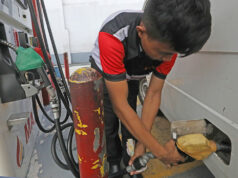BSP open to issuing more licenses to digital banks

By Beatriz Marie D. Cruz, Reporter
THE PHILIPPINE central bank is considering issuing more licenses to digital banks on top of the six operating now after receiving expressions of interest from several entities, its governor said.
“Once we understand more, we’re happy to open it up so that we can issue more digital licenses,” Bangko Sentral ng Pilipinas (BSP) Governor Eli M. Remolona, Jr. told a news briefing on Wednesday. “We’re looking at what’s going on and we’re trying to understand the new business models that they bring.”
Digital banks in Asia and the world have barely disrupted their nondigital counterparts years after being allowed to operate, with many still in the red. Only two of the six digital banks in the Philippines are making money.
“I think many are interested, quite a few are interested, and they can’t wait for us to open it up,” Mr. Remolona said.
BSP Director Melchor T. Plabasan said the industry report on the digital banking sector would be released by April.
“We are expected to submit an industry report and part of that report is our recommendation on whether to, let’s say, is it going to be a partial lifting, is it complete lifting, or is it going to be an extension of the moratorium,” he told the same briefing.
The report will focus on the impact of digital banks on the overall financial system.
In 2021, the BSP capped the number of digital banking licenses to six as it monitors the development of the sector and boosts its regulatory capacity.
The six online lenders operating in the country are: Tonik Digital Bank, Inc.; GoTyme Bank of the Gokongwei group and Singapore-based Tyme; Maya Bank of Voyager Innovations, Inc.; Overseas Filipino Bank, a subsidiary of Land Bank of the Philippines; UNObank of DigibankASIA Pte. Ltd.; and UnionDigital Bank of Union Bank of the Philippines, Inc. (UnionBank).
“The reason that we have issued only six licenses for digital banks is because we want them to try different things and try to succeed in doing banking in a purely digital way,” Mr. Remolona said.
However, the BSP chief noted that digital banks continue to struggle with loan disbursements and collections.
Only two out of the six digital banks are profitable at present, the central bank said.
“The expectation is that it would take around five to seven years before a digital bank becomes profitable,” Mr. Plabasan said, noting that only 5% of online banks globally are profitable.
“We are expecting that there will be losses, but we don’t expect that some will be out of the red already, probably even before the five to seven years,” he added.
Overall, the six online banks have about 8.7 million deposit accounts, which make up 7% of the banking industry, Mr. Plabasan said.
UnionBank Chief Economist Ruben Carlo O. Asuncion said lifting the moratorium is acknowledgment that more players are needed to drive the BSP’s financial inclusion goals.
“There are a lot of rules that are in place to prevent the addition of more players in the digital banking space from causing system risks,” he said in a Viber message.
Security Bank Corp. Chief Economist Robert Dan J. Roces said lifting the moratorium on digital banking licenses would boost innovation and financial inclusion.
“Stringent licensing requirements like rigorous due diligence and robust risk management frameworks will help mitigate systemic risk, along with a phased approach with close supervision, regular stress tests, and open communication that will allow the BSP to adapt its regulations as the digital banking landscape evolves,” Mr. Roces said in a Viber chat.
Enrico P. Villanueva, a senior lecturer at the University of the Philippines Los Baños Economics Department, said the BSP should look into how digital banks can continue to offer high deposit interest rates.
“Raising deposits via high interest rate offers is easy, but can that model be sustained? Do these banks have sufficient assets and margin to pay their high deposit costs?” he said in an X (formerly Twitter) message.



